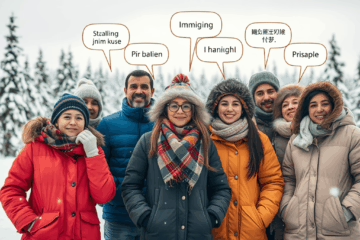Refugee claims for minors in Canada are a critical aspect of the country’s immigration and asylum system. The process involves multiple legal and procedural steps designed to ensure the safety and well-being of the most vulnerable individuals—children and adolescents fleeing persecution, violence, or other dire circumstances in their home countries. This article delves into the various facets of refugee claims for minors in Canada, highlighting their legal rights, designated representatives’ roles, guardian responsibilities, filing procedures, and available support services.
Table of contents
- Understanding Refugee Claims for Minors in Canada
- The Legal Rights of Minor Refugees in Canada
- Role of a Designated Representative in Claims
- Guardian Responsibilities in Refugee Applications
- Procedures for Filing Refugee Claims for Minors
- Support Services for Minor Refugees in Canada
- Consult with a Vancouver Immigration Lawyer Today!
Understanding Refugee Claims for Minors in Canada
Refugee claims for minors in Canada are specialized processes that recognize the unique vulnerabilities and needs of children and adolescents seeking asylum. Unlike adult claimants, minors often face additional challenges, such as separation from family members, lack of documentation, and emotional trauma. The Canadian government has established specific protocols to address these issues, ensuring minor refugees receive the protection and support they need.
The Immigration and Refugee Board of Canada (IRB) is the primary body responsible for adjudicating refugee claims, including those made by minors. The IRB considers the child’s best interests as a paramount concern in all its decisions. This means that the board takes into account not only the risk of persecution but also the child’s overall well-being, including their psychological and emotional health.
Minors can make refugee claims alone or as part of a family unit. In cases where a minor is unaccompanied or separated from their family, additional safeguards are put in place to ensure their protection. These include appointing a designated representative and possibly a guardian to oversee the minor’s claim and welfare.
Minors seeking refugee status must understand that Canadian authorities take their claims very seriously. The process is designed to be as child-friendly as possible, with various support mechanisms to help minors navigate the complex legal landscape of refugee claims.
The Legal Rights of Minor Refugees in Canada
Minor refugees in Canada are entitled to a range of legal rights designed to protect their well-being and ensure fair treatment throughout the refugee claim process. One of the most fundamental rights is the right to legal representation. Minors have the right to be represented by a lawyer or legal advisor who can help them understand the legal procedures and advocate on their behalf.
Another crucial right is the right to education. Regardless of their immigration status, minor refugees in Canada have the right to attend school and receive an education. This aligns with Canada’s commitment to the United Nations Convention on the Rights of the Child, which emphasizes the importance of education for all children.
Healthcare is another vital area where minor refugees have specific rights. They are entitled to access healthcare services, including mental health support, which is often crucial given the traumatic experiences many have endured. The Interim Federal Health Program (IFHP) provides temporary health coverage for refugee claimants, including minors, until they become eligible for provincial or territorial health insurance.
Furthermore, minor refugees have the right to be heard in matters affecting them. This means that their views and preferences should be considered in decisions about their refugee claims. The IRB and other relevant authorities are required to consider the child’s perspective, ensuring that their voice is not overlooked in the decision-making process.
Role of a Designated Representative in Claims
A designated representative is pivotal in the refugee claims process for minors in Canada. This individual is appointed to protect the minor’s interests throughout the legal proceedings. The designated representative can be a lawyer, social worker, or another responsible adult capable of understanding the refugee claim process and advocating for the minor’s best interests.
The primary responsibility of a designated representative is to ensure that the minor understands the refugee claim process. They explain the legal procedures, help the minor prepare for hearings, and ensure all necessary documentation is submitted. This support is crucial for minors who may be overwhelmed by the complexity of the legal system and their precarious situation.
In addition to providing guidance, the designated representative also acts as the minor’s voice in the legal proceedings. They communicate the minor’s wishes and concerns to the IRB and relevant authorities, ensuring that the minor’s perspective is considered in all decisions related to their refugee claim.
The role of a designated representative is not limited to legal advocacy. They also provide emotional support, helping the minor cope with the stress and uncertainty of the refugee claim process. This holistic approach ensures that the minor’s overall well-being is considered, not just their legal status.
Guardian Responsibilities in Refugee Applications
Guardians play a crucial role in the lives of minor refugees, especially when navigating the refugee claim process in Canada. A guardian is typically responsible for the day-to-day care and well-being of the minor, ensuring that their basic needs are met. This includes providing shelter, food, and emotional support, which is essential for the minor’s overall stability and development.
One of the key responsibilities of a guardian in the context of refugee applications is to assist with the preparation and submission of the refugee claim. This involves gathering necessary documentation, completing application forms, and meeting all deadlines. The guardian works closely with the designated representative and legal counsel to ensure that the minor’s claim is as comprehensive and accurate as possible.
Guardians also play a vital role in ensuring the minor attends all required appointments and hearings related to their refugee claim. This includes meetings with the designated representative, legal counsel, and IRB hearings. The guardian provides logistical support, such as transportation and scheduling, to ensure that the minor can fully participate in the refugee claim process.
In addition to these practical responsibilities, guardians provide emotional and psychological support to the minor throughout the refugee claim process. This is particularly important given the traumatic experiences that many minor refugees have endured. The guardian helps the minor navigate the emotional challenges of seeking asylum, providing stability and reassurance during a tumultuous time.
Procedures for Filing Refugee Claims for Minors
Filing a refugee claim for a minor in Canada involves several procedural steps, each designed to ensure that the claim is thoroughly reviewed and the minor’s rights are protected. The process typically begins with submitting a Basis of Claim (BOC) form to the IRB. This form outlines why the minor seeks refugee status and details their background and circumstances.
Once the BOC form is submitted, the IRB schedules a hearing to review the minor’s claim. During this hearing, the minor, accompanied by their designated representative and legal counsel, presents their case. The IRB considers various factors, including the minor’s testimony, supporting documentation, and relevant country conditions, to determine whether the minor qualifies for refugee protection.
Additional safeguards are in place in cases where the minor is unaccompanied or separated from their family. The IRB ensures that a designated representative is appointed to protect the minor’s interests. This representative plays a crucial role in preparing the minor for the hearing, explaining the procedures, and advocating.
It is important to note that the refugee claim process for minors in Canada is designed to be as child-friendly as possible. This includes providing age-appropriate explanations of the procedures, ensuring that the minor’s voice is heard, and considering the child’s best interests in all decisions. These measures help to ensure that minor refugees receive fair and compassionate treatment throughout the refugee claim process.
Support Services for Minor Refugees in Canada
Canada offers support services to assist minor refugees throughout the refugee claim process and beyond. One primary support mechanism is access to legal aid. Many provinces and territories provide legal aid services to refugee claimants, including minors, ensuring that they have access to legal representation and advice.
In addition to legal aid, minor refugees can access various social services designed to support their integration into Canadian society. These services include settlement programs that assist with housing, education, and employment. Settlement workers help minors navigate these services, ensuring they have the necessary resources to build a stable and successful life in Canada.
Mental health support is another critical area of support for minor refugees. Many minor refugees have experienced significant trauma, and access to mental health services is essential for their recovery and well-being. Canada offers a range of mental health services, including counselling and therapy, to help minor refugees cope with their experiences and build resilience.
Educational support is also a key component of the support services available to minor refugees. Canada is committed to ensuring that all children, regardless of their immigration status, have access to education. Schools provide additional support to minor refugees, including language classes, tutoring, and counselling, to help them succeed academically and socially.
Navigating the refugee claim process is a complex and challenging journey, particularly for minors who require additional protection and support. Canada’s comprehensive approach, which includes legal rights, designated representatives, guardian responsibilities, and a range of support services, aims to ensure that minor refugees receive the care and protection they need. By understanding the procedures and resources available, stakeholders can better support minor refugees as they seek safety and build new lives in Canada.
Minor refugees often face additional challenges, such as separation from family members, lack of documentation, and emotional trauma.
The Immigration and Refugee Board of Canada (IRB) is the primary body adjudicating refugee claims.
Yes, minors can make refugee claims alone or as part of a family unit.
The IRB considers the child’s best interests, including their psychological and emotional health, in all its decisions.
Minor refugees have the right to legal representation by a lawyer or legal advisor.
Yes, minor refugees are entitled to access healthcare services, including mental health support, through the Interim Federal Health Program (IFHP).
Minor refugees have the right to be heard in matters affecting them, and the IRB and other relevant authorities should consider their views and preferences.
A designated representative can be a lawyer, social worker, or another responsible adult capable of advocating for the minor’s best interests.
The primary responsibility is to ensure the minor understands the refugee claim process and to advocate for their best interests.
They explain legal procedures, help prepare for hearings, submit necessary documentation, and communicate the minor’s wishes and concerns to the IRB.
They provide emotional support, helping the minor cope with the stress and uncertainty of the refugee claim process.
A guardian is responsible for the day-to-day care and well-being of the minor, including providing shelter, food, and emotional support.
A guardian helps gather necessary documentation, complete application forms, and meet all deadlines.
Guardians ensure the minor attends all required appointments and hearings, providing transportation and scheduling support.
Many minor refugees have endured traumatic experiences, and emotional support helps them navigate the challenges of seeking asylum.
The process typically begins with submitting a Basis of Claim (BOC) form to the IRB.
The IRB schedules a hearing to review the minor’s claim, where the minor presents their case with the help of their designated representative and legal counsel.
The IRB appoints a designated representative to protect the minor’s interests and ensure they are prepared for the hearing.
The process includes providing age-appropriate explanations, ensuring the minor’s voice is heard, and considering the child’s best interests in all decisions.
Many provinces and territories provide legal aid services to refugee claimants, including minors.
Settlement programs assist with housing, education, and employment, helping minors integrate into Canadian society.
Many minor refugees have experienced significant trauma, and mental health services are essential for their recovery and well-being.
Schools offer additional support, including language classes, tutoring, and counselling, to help minor refugees succeed academically and socially.
The goal is to ensure that minor refugees receive the care and protection they need, with a comprehensive approach that includes legal rights, designated representatives, guardian responsibilities, and support services.
Consult with a Vancouver Immigration Lawyer Today!
Discover more from Pax Law Corporation
Subscribe to get the latest posts sent to your email.



1 Comment
Https://Mdssar.Org/Piwigo/Picture.Php?/5214 · 20/07/2024 at 10:08 pm
I just love your featuring this info for people seeking to get more information about subject areas such as this.
Your weblog was well crafted and well investigated, that is certainly significantly
treasured. I am often searching for new weblogs to follow and read regularly.